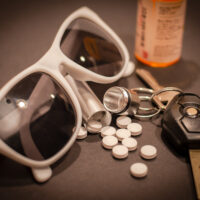Defending Against Prescription Drug-Related DUI Charges in New York

Most people understand that driving under the influence of alcohol or illegal drugs can lead to serious criminal charges. What many don’t realize is that prescription medications—even those legally prescribed and taken as directed—can also form the basis for a DUI charge in New York. If law enforcement believes your ability to operate a vehicle has been impaired by any substance, including prescribed medication, you can be arrested and charged with Driving While Ability Impaired by Drugs, or DWAI–Drugs. These charges carry harsh penalties and long-term consequences, which is why it’s critical to understand the law and your legal options. Read more below, and contact Dupée & Monroe, P.C., after an arrest in Orange County or the Hudson Valley for help from an experienced and successful Goshen DWI/DWAI defense attorney.
DWAI-Drugs and Prescription Medication
In New York, a driver can be charged with DWAI–Drugs when they are found to be operating a motor vehicle while their mental or physical faculties are impaired by a drug. This includes not only controlled substances but also lawfully prescribed medications such as painkillers, anti-anxiety drugs, sleep aids, and other medications that may cause drowsiness or impair coordination. Importantly, the legality of the prescription does not provide a defense if the medication negatively affects your ability to drive safely. In other words, it’s not illegal to take prescription drugs—but it is illegal to drive while impaired by them.
Common medications that have led to DWAI–Drugs arrests in New York include benzodiazepines like Xanax or Ativan, opioids like oxycodone or hydrocodone, muscle relaxants, and even some antihistamines or antidepressants. If a police officer pulls you over and observes signs of impairment—such as slurred speech, erratic driving, confusion, or poor motor coordination—you may be arrested, even if you haven’t consumed alcohol or taken any illegal substances. In many cases, a drug recognition expert (DRE) may be called to the scene to perform an evaluation, and you may be required to submit to a chemical test to detect the presence of drugs in your system.
DWAI-Drugs Defense Strategies
Defending against a prescription drug-related DUI charge can be complex, but there are often strong legal arguments to challenge the arrest or reduce the consequences. One of the most important things to understand is that, unlike alcohol-related DWIs, there is no legal threshold or “per se” limit for drugs. A driver cannot be convicted based solely on the presence of a drug in their system. The prosecution must prove that the drug actually impaired your ability to drive at the time you were behind the wheel. This opens the door to several possible defense strategies.
First, your attorney may be able to challenge whether the officer had probable cause to stop your vehicle or arrest you in the first place. If the traffic stop or subsequent arrest violated your constitutional rights, the evidence gathered—including statements you made, field sobriety test results, or drug test results—may be excluded from the case. Without that evidence, the prosecution may have no choice but to reduce or dismiss the charges.
Second, the reliability of drug testing procedures is often a central issue in these cases. Unlike alcohol breath tests, which are widely used and standardized, drug tests are more complex and often involve urine or blood samples that can be subject to contamination, improper storage, or misinterpretation. A skilled defense lawyer may be able to question the chain of custody, laboratory procedures, or the qualifications of those analyzing the results.
Third, your defense may focus on the lack of evidence of actual impairment. Just because a medication was detected in your system does not mean it was affecting your ability to drive. Many prescription drugs remain detectable in the body for hours or even days after any impairing effects have worn off. Your attorney may introduce medical or scientific evidence to show that you were not impaired at the time of driving, or that your behavior was not consistent with impairment.
Another key aspect of your defense may involve your prescription itself. While having a prescription is not a complete defense, it can help establish that you were taking the medication under medical supervision and not abusing the substance. In some cases, the effects of a drug may be unexpected or interact with other medications in unforeseen ways. These factors can support a request for leniency, reduced charges, or alternative sentencing options such as participation in a treatment or diversion program rather than jail time.
Contact the Goshen DWI Defense Lawyers at Dupée & Monroe, P.C.
At Dupée & Monroe, P.C., we understand how stressful and confusing it can be to face criminal charges for something you thought was perfectly legal. Many of our clients charged with prescription drug-related DWAI offenses have no prior criminal history and were simply following their doctor’s orders. We believe that good people can make honest mistakes, and we are committed to defending your rights, your record, and your future.
We serve clients in Goshen, Orange County, and across the Hudson Valley, providing experienced and strategic criminal defense against all types of impaired driving charges. If you’ve been arrested for DUI based on prescription drug use, don’t wait to seek legal representation. These cases require a detailed review of the facts, medical records, lab results, and law enforcement procedures.
Contact Dupée & Monroe, P.C. today to schedule a confidential consultation. Let us help you fight the charges and work toward the best possible outcome in your case.
